The end of the year is always a good time to review recent changes to the federal laws and regulations that could impact you and your business. To help, we have compiled a short breakdown of recent tax and other items that we believe you should be aware of as we look ahead to 2025.
BOI reports must be filed by Dec. 31
Businesses formed prior to 2024 that are required to file beneficial ownership information (BOI) reports with the Financial Crimes Enforcement Network (FinCEN) must do so by the end of the year.
A recent federal court decision in Arkansas caused some confusion when it found FinCEN could not penalize members of the National Small Business Association (NSBA) for not filing BOI reports. However, all non-NSBA businesses formed prior to 2024 must still file by Dec. 31 if they are required to file under the Corporate Transparency Act (CTA). An appeal of the Arkansas decision by the Justice Department and court challenges filed in other states could result in additional changes to BOI filing requirements in the future.
Businesses formed during 2024 that met the filing requirements had 90 days to file their initial BOI report, but businesses formed during 2025 or later will only have 30 days to file.
Who must file?
Under the CTA, most entities that are formed by filing with the secretary of state must file a BOI report with FinCEN. This includes most C corporations, S corporations and limited liability companies (LLCs). Foreign companies must register if they have registered to do business with the secretary of state or similar state office.
Most 501(c) nonprofits are not required to file reports, but other types of nonprofits may be required to file. Other entities that are exempt from filing reports include large companies, banks, securities dealers or brokers, insurance companies and inactive entities.
Who is a beneficial owner?
A beneficial owner that must be named in a BOI report is an individual who either directly or indirectly:
- Exercises substantial control over the reporting company
- Owns or controls at least 25% of a reporting company
Penalties for non-filers
The maximum civil penalty for willfully violating BOI reporting requirements is currently $591 per day. A person who willfully violates the requirement may also be subject to a criminal penalty of up to two years in prison and a $10,000 fine.
IRS speeding up processing of ERC claims
The IRS restarted processing new claims for the employee retention credit (ERC) after a nearly one-year pause to address the large number of erroneous claims it received. The agency announced in September 2023 a moratorium on the processing of new claims to allow its employees to address the high number of improper claims it received. The erroneous claims were the result of promoters encouraging ineligible businesses to cash in by claiming the credit. The IRS is processing claims filed between Sept. 14, 2023, and Jan. 31, 2024, and is moving quickly to pay claims it has deemed to be at low risk of being incorrect and has increased the pace at which it is sending out letters disallowing the claim.
With the IRS processing large numbers of new claims, there is an increased likelihood of legitimate ERC claims being denied. While many of the taxpayers who receive letters denying their claims were never eligible for the ERC, the IRS has acknowledged that some deserving businesses could see their claims denied. If your business received notice that its ERC claim has been denied and you believe it was eligible, the IRS offers the opportunity to appeal. However, you must move quickly because you only have 30 days from the date of the denial letter to ask the IRS to reconsider your denied claim.
If your business filed an ERC claim for which it is not eligible, there is still time to withdraw the claim if it has not been processed by the IRS or if it has not cashed a refund check it received based on the improper ERC claim. Withdrawn claims are treated as never having been made and there is no penalty. The IRS has run two amnesty programs that allowed the recipients of improper ERC claims to repay 80-85% of the funds they received, but the most recent amnesty closed on Nov. 22. It is not clear if the IRS will offer another ERC amnesty.
Employer-provided student loan benefits
Employers that want to help their employees with their student loan bills have two tax-advantaged options available:
- Student loan matching. Provisions in the 2022 SECURE 2.0 Act allow sponsors of 401(k) or similar retirement plans to provide matching contributions based on eligible student loan payments made by participating employees instead of matching contributions to the retirement plan. Sponsors of 401(k), 403(b), SIMPLE IRA or governmental 457(b) plans have been permitted to make the matching contributions as of Jan. 1, 2024.
- Educational assistance for student loans. Employers may use their educational assistance programs to pay the principal and interest on an employee’s qualified education loan through the end of 2025. After that time, the programs may only be used to pay for an employee’s books, equipment, supplies, fees, tuition and other education expenses.
Beware of predatory OIC mills
You have probably heard ads on the radio or seen ads on social media where a business claims it can settle your tax bill for pennies on the dollar and wondered how they can do that. The truth is that these ads are often placed by unscrupulous promoters who charge high fees to submit offers-in-compromise (OICs) to the IRS to settle a tax bill. What those advertisements fail to tell you is that the IRS often rejects the OICs, but the promoter keeps their fee, regardless of the outcome.
The IRS is warning taxpayers about these unscrupulous “OIC mills” that sell their services to unsuspecting customers. OICs are a legitimate tool for taxpayers to reduce their tax bills in limited situations where they can prove they are unable to pay the full amount due, but the IRS only accepts an offer when the taxpayer can prove that they truly can’t pay or work out a payment arrangement.
If you have an unresolved tax bill that you are unable to pay, please contact us for help. We can review your financial situation to see whether you really are a candidate for an OIC. If not, we can often work out another payment arrangement with the IRS to resolve your tax bill.
Remember the tax credit for commercial clean vehicles
If your business or tax-exempt entity is thinking about purchasing a commercial vehicle, it might make sense to consider an electric or fuel cell vehicle that is eligible for a tax credit of up to $40,000. The maximum credit amount is $7,500 for vehicles weighing less than 14,000 pounds, such as cars, vans and many pickup trucks, but the maximum credit jumps to $40,000 for vehicles that weigh 14,000 or more, such as buses and semi-trucks.
The amount of the credit is the smaller of the amount determined through one of the following two calculations:
- Taxpayer’s basis in the vehicle (amount invested for tax purposes) and engine typea. 30% of basis for a vehicle not powered by a gasoline or diesel engine, such as an electric or fuel cell vehicle
- b. 15% of basis for a vehicle powered, or partially powered, by a gasoline or diesel engine, such as a plug-in-hybrid electric vehicle
- Incremental cost of the vehicle that is in excess of a gas-powered vehicle. This is the amount by which the purchase price of the clean vehicle exceeds the price of a comparable vehicle powered by a gas or diesel engine. Taxpayers can use the safe harbor incremental costs published by the Department of Energy in place of the actual calculation.
There is no limit to the number of commercial clean vehicle credits that can be claimed by one taxpayer in any given year.
Your trusted partner in financial success
In today’s complex financial world, having someone you can trust by your side is invaluable. While some ads may suggest breaking up with your tax preparer, there’s a lot at stake when it comes to your financial future — not just during tax season but all year long. Our firm is here to be more than a seasonal resource. We’re committed to being a partner who genuinely understands your unique financial situation and helps you plan for the future.
Building a lasting relationship
When we work together, you’re more than just the numbers on your return; our firm gets to know the story behind them. We learn about your family’s needs, career goals and life transitions. This personal connection allows us to offer guidance and support customized to you and your future. Unlike automated platforms, we’re here for you year after year, bringing consistency and stability to your financial planning. Whether you’re starting a business, saving for a big life event or planning for retirement, we’re here to help you make decisions with confidence.
Expertise you can trust
The tax world can be confusing, but that’s where we come in. Our firm stays on top of changing regulations to ensure you’re always compliant and making the most of your return. When questions arise — whether from the IRS or due to new tax code changes — you can rely on us to represent your interests with care and precision. Our goal is to give you peace of mind, knowing you have someone who understands your financial situation and is advocating for you.
We hope this brief was informative and useful. As always, we’re available for any questions you might have about your tax situation.
Download PDF Version of this brief





